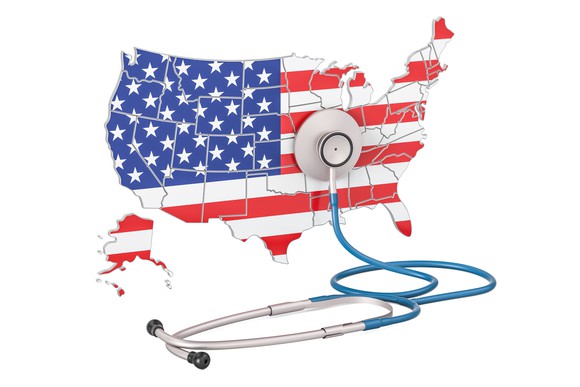Where can Americans get the best healthcare?
Financial website WalletHub set out to answer this question by evaluating each U.S. state and the District of Columbia in three areas: cost, access, and outcomes. WalletHub used data from a variety of sources, including federal agencies and non-profit organizations that focus on healthcare.
Here are the top five states for healthcare based on WalletHub's research -- and why they ranked so highly.

IMAGE SOURCE: GETTY IMAGES.
1. Hawaii
The Aloha State topped the list of the best states for healthcare. Hawaii also ranked as the best state in healthcare outcomes. Healthcare outcomes were evaluated by looking at infant, child, and maternal mortality rates, patient hospital readmissions, life expectancy, rates of serious diseases including cancer, heart disease, and diabetes, as well as several other criteria.
In addition, WalletHub found that Hawaii was in the top five states in a couple of detailed areas of analysis. Hawaii had the lowest rate of heart disease in the U.S. It also ranked fourth in the percentage of insured adults ages 18 to 64.
2. Iowa and Minnesota (tie)
Iowa and Minnesota tied for second place in the overall ranking of the best states for healthcare. Iowa took the No. 2 spot for cost, which was calculated by reviewing the costs of medical and dental visits and average monthly insurance premiums, as well as the percentage share of high out-of-pocket medical spending and percentage share of adults with no doctor visits due to cost. Minnesota ranked fifth in the cost category.
Both states also performed well in the other two major categories in the WalletHub study. Iowa ranked 13th in healthcare outcomes, while Minnesota was in 11th place for access to healthcare.
The two states rated highly in several detailed areas of focus in the analysis as well. Iowa has the most hospital beds per capita and the second-lowest infant mortality rate of any U.S. state. Minnesota ranked second in heart disease rates, third in physician Medicare-acceptance rates, and fifth in percentage of insured adults ages 18 to 64.
4. New Hampshire
The Granite State claimed the No. 4 spot for healthcare. New Hampshire also ranked fourth in access to healthcare and seventh in healthcare outcomes.
There were also a couple of detailed areas where New Hampshire rated highly. The state had the second-best physician Medicare-acceptance rate and boasted the lowest infant mortality rate.
5. District of Columbia
Technically, the District of Columbia isn't a state. However, WalletHub listed D.C. as the fifth-best place to live in the U.S. for healthcare.
The District of Columbia took the top position for healthcare cost. It also ranked sixth in access to healthcare. In addition, the nation's capital district performed very well in several detailed categories, making the top five for most hospital beds per capita, most physicians per capita, most dentists per capita, highest percentage of insured adults ages 18 to 64, and highest percentage of insured children ages 0 to 17.
How does your state stack up?
Here's the complete ranking of the rest of the states in WalletHub's healthcare analysis:
| 6. Connecticut | 16. North Dakota | 26. Washington | 36. Kentucky | 46. Georgia |
| 7. South Dakota | 17. Nebraska | 27. Michigan | 37. Missouri | 47. North Carolina |
| 8. Vermont | 18. Pennsylvania | 28. New York | 38. West Virginia | 48. Arkansas |
| 9. Massachusetts | 19. Illinois | 29. New Mexico | 39. Oklahoma | 49. Alaska |
| 10. Rhode Island | 20. Virginia | 30. Indiana | 40. Tennessee | 50. Mississippi |
| 11. Maryland | 21. Wisconsin | 31. Wyoming | 41. Texas | 51. Louisiana |
| 12. Kansas | 22. Ohio | 32. Arizona | 42. Nevada | |
| 13. Colorado | 23. Delaware | 33. Idaho | 43. Florida | |
| 14. Maine | 24. New Jersey | 34. Oregon | 44. Alabama | |
| 15. Utah | 25. California | 35. Montana | 45. South Carolina |
Healthcare costs vary widely by state, especially when it comes to health insurance premiums. But remember that cost isn't the only key factor in the WalletHub study. For example, Massachusetts made the top 10 in this list but had the highest per-capita healthcare costs(excluding health insurance premiums) of any state just a few years ago.
If your state ranks low on the list, is there a chance that it could move up in the near future? Probably not.
WalletHub's methodology weights access to healthcare, cost, and healthcare outcomes equally. Access to healthcare is primarily evaluated by the numbers of different types of healthcare providers in each state. A sudden rush of healthcare providers to a state or massive wave of new hospitals seems pretty unrealistic. Healthcare outcomes is heavily influenced by mortality rates and disease rates that aren't likely to improve significantly in a short period of time.
Healthcare costs could change within a state, though. That's especially the case if a state is left with only one insurer on the Obamacare exchanges. Still, though, because cost is only one-third of the overall score, don't expect it to help a state move up very much on future rankings.
Mark Cuban predicts this will make someone a trillion dollarsShark Tank's Mark Cuban recently predicted that an emerging tech trend would make someone $1 trillion. That lucky future trillionaire is just the beginning -- and the trend itself could be worth as much as $19.9 trillion.
Fortunately, this hasn’t yet gone mainstream -- most people haven’t recognized the scale of opportunity here.
We believe that one market expert has the right answer for investors looking to get in early -- and potentially win big.










